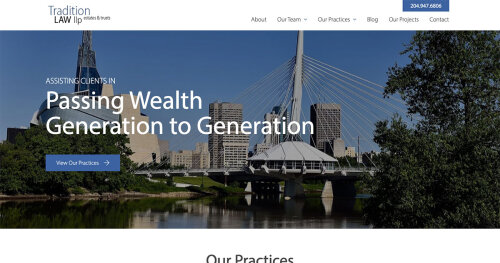Best Energy Regulatory Law Lawyers in Winnipeg
Share your needs with us, get contacted by law firms.
Free. Takes 2 min.
List of the best lawyers in Winnipeg, Canada
About Energy Regulatory Law in Winnipeg, Canada
Energy regulatory law in Winnipeg deals with the legal framework that governs the generation, transmission, distribution, and sale of energy, including electricity, natural gas, and renewable sources. It encompasses a wide range of rules and regulations that aim to ensure fair pricing, reliable supply, environmental protection, and the safety of energy infrastructure. In Winnipeg, as part of the province of Manitoba, energy regulation also involves compliance with both provincial and federal laws, overseen by regulatory bodies such as the Manitoba Public Utilities Board and the Canada Energy Regulator. Key areas include licensing, rate setting, environmental assessments, and stakeholder engagement.
Why You May Need a Lawyer
People may need a lawyer specializing in energy regulatory law for various reasons. Common situations include:
- Negotiating or reviewing energy supply contracts
- Responding to regulatory investigations or compliance audits
- Participating in rate hearings or applications before the Manitoba Public Utilities Board
- Addressing land use or environmental concerns related to energy projects
- Challenges to regulatory decisions or enforcement actions
- Navigating the process for obtaining licenses, permits, or approvals
- Facilitating renewable energy developments
- Advising on market entry for new energy providers or technologies
- Engaging with Indigenous and local communities regarding energy projects
Legal counsel can help individuals and businesses avoid costly mistakes, understand their rights and obligations, and ensure compliance with complex regulations.
Local Laws Overview
Energy regulatory law in Winnipeg is shaped by a mix of provincial and federal statutes, regulations, and policies. The primary piece of provincial legislation is The Public Utilities Board Act, which establishes the rate-setting, licensing, and oversight role of the Manitoba Public Utilities Board (PUB). The PUB regulates Manitoba Hydro, which is the major supplier of electricity and natural gas in Winnipeg and across Manitoba. The PUB is responsible for reviewing and approving rates, hearing consumer complaints, and conducting public inquiries.
Federal laws also play a role, especially concerning interprovincial and international transmission of energy, pipeline regulation, and environmental impact assessments of major projects. The Canada Energy Regulator oversees these areas at the national level. Environmental regulations in Manitoba are guided by The Environment Act and related statutes that impose requirements for environmental assessments, emissions, and mitigation.
Indigenous consultation is another key aspect, as energy projects must respect the rights and interests of Indigenous communities under Section 35 of the Constitution Act, 1982. This means proponents must engage in meaningful consultations when projects may affect traditional lands or treaty rights.
Frequently Asked Questions
What does the Manitoba Public Utilities Board regulate?
The Manitoba Public Utilities Board regulates the rates and services of public utilities, primarily electricity and natural gas providers, and oversees matters related to insurance, motor carriers, and pipelines in Manitoba. The Board conducts hearings and approves prices charged to consumers.
Do I need approval to build a power generation facility in Winnipeg?
Yes, building a power generation facility typically requires multiple approvals, including land use permits, environmental assessments, and regulatory approval from the Manitoba Public Utilities Board and sometimes the federal Canada Energy Regulator, depending on the project's scope and location.
How are energy rates set in Winnipeg?
Energy rates are set through applications made by utilities such as Manitoba Hydro to the Manitoba Public Utilities Board. The Board holds hearings, considers evidence from stakeholders, and determines whether proposed rates are just and reasonable before issuing a decision.
What should I do if I have a complaint about my energy provider?
You should attempt to resolve the issue directly with your energy provider first. If you cannot resolve the matter, you can file a complaint with the Manitoba Public Utilities Board, which can investigate customer concerns and may order remedies if the provider is found at fault.
Are there special laws for renewable energy projects?
Yes, renewable energy projects are subject to specific environmental and planning laws, in addition to standard utility regulations. Approvals often require environmental assessments, community consultation, and compliance with both provincial and municipal codes.
How does Indigenous consultation affect energy projects?
Projects on or impacting Indigenous lands or rights require meaningful consultation with affected communities. This is a constitutional obligation and may involve negotiations, accommodation measures, and modifications to project plans to address concerns.
Can I challenge a regulatory decision?
Yes, parties affected by a regulatory decision from the Manitoba Public Utilities Board or other regulatory authorities may seek a judicial review in court. Grounds must generally relate to errors of law, procedure, or jurisdiction.
Is it possible for a new company to enter the energy market in Winnipeg?
Entering the energy market involves significant regulatory compliance, including licensing, approvals from the Manitoba Public Utilities Board, and meeting technical, financial, and operational standards. Legal advisors can help navigate the process and improve the likelihood of approval.
What environmental laws apply to energy developments in Winnipeg?
Energy projects are governed by The Environment Act (Manitoba), federal environmental assessment laws, and local planning bylaws. Proponents must conduct environmental assessments and implement mitigation plans to manage impacts such as emissions, noise, and wildlife disturbance.
When should I contact a lawyer about an energy regulatory issue?
You should contact a lawyer as soon as you anticipate dealing with regulatory approvals, face a compliance investigation, receive legal notice from a regulator, or need advice on significant contracts or stakeholder engagements related to energy projects.
Additional Resources
- Manitoba Public Utilities Board - primary provincial energy regulator
- Manitoba Hydro - main public utility for electricity and natural gas
- Canada Energy Regulator - federal regulator for pipelines and interprovincial/international energy matters
- Manitoba Environment and Climate - oversees environmental assessment processes
- Assembly of Manitoba Chiefs - for Indigenous consultation resources
- Manitoba Law Library - for legal information and research services
- Law Society of Manitoba - for lawyer referrals and legal aid services
Next Steps
If you require legal advice or assistance regarding energy regulatory law in Winnipeg, begin by identifying the specific issue or project you are dealing with. Collect all relevant documents such as contracts, correspondence with regulators, and notices or applications. Consider reaching out to a lawyer who specializes in energy regulatory matters in Manitoba. You can find qualified legal professionals through the Law Society of Manitoba or by seeking a referral from local business associations or community organizations.
Schedule a consultation to discuss your needs, and be prepared to ask questions about the lawyer's experience with similar matters, fees, and the likely process and timeline. If you are facing an urgent deadline or legal notice, act promptly to preserve your rights and maximize your options for resolution.
Stay informed by consulting the resources listed above, attending public hearings, or joining local information sessions about energy regulation. Navigating energy regulatory law can be complex, but with qualified legal support, you can protect your interests and ensure compliance every step of the way.
Lawzana helps you find the best lawyers and law firms in Winnipeg through a curated and pre-screened list of qualified legal professionals. Our platform offers rankings and detailed profiles of attorneys and law firms, allowing you to compare based on practice areas, including Energy Regulatory Law, experience, and client feedback.
Each profile includes a description of the firm's areas of practice, client reviews, team members and partners, year of establishment, spoken languages, office locations, contact information, social media presence, and any published articles or resources. Most firms on our platform speak English and are experienced in both local and international legal matters.
Get a quote from top-rated law firms in Winnipeg, Canada — quickly, securely, and without unnecessary hassle.
Disclaimer:
The information provided on this page is for general informational purposes only and does not constitute legal advice. While we strive to ensure the accuracy and relevance of the content, legal information may change over time, and interpretations of the law can vary. You should always consult with a qualified legal professional for advice specific to your situation.
We disclaim all liability for actions taken or not taken based on the content of this page. If you believe any information is incorrect or outdated, please contact us, and we will review and update it where appropriate.










